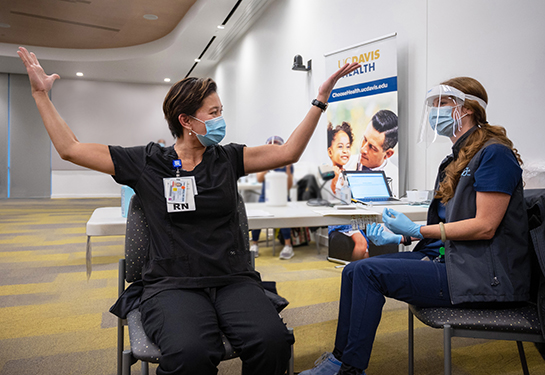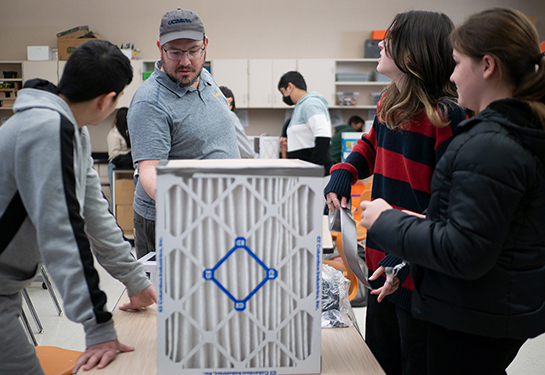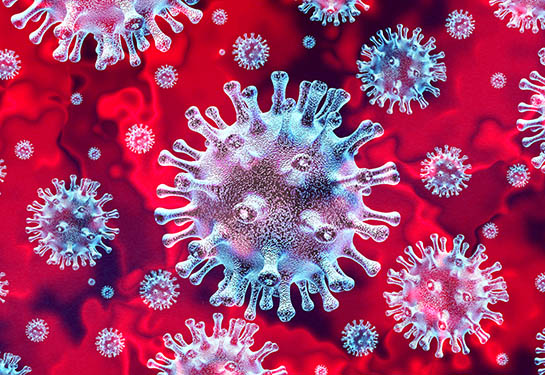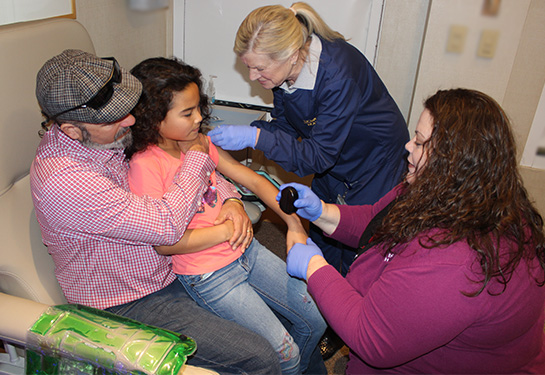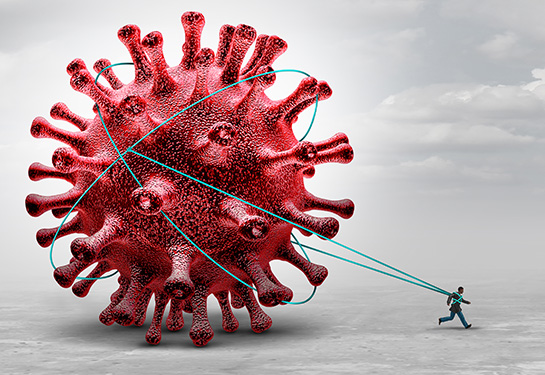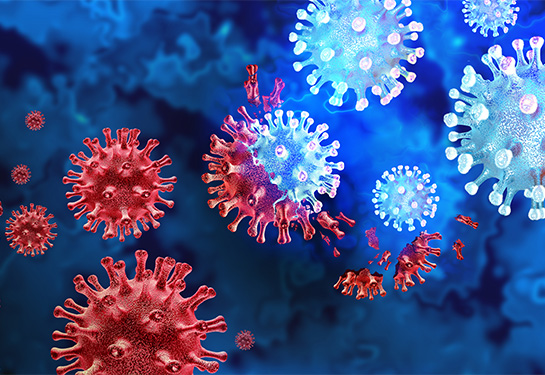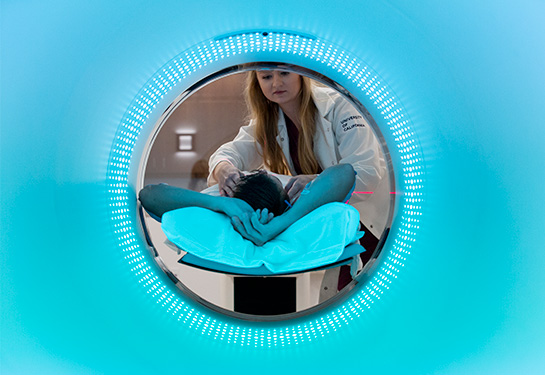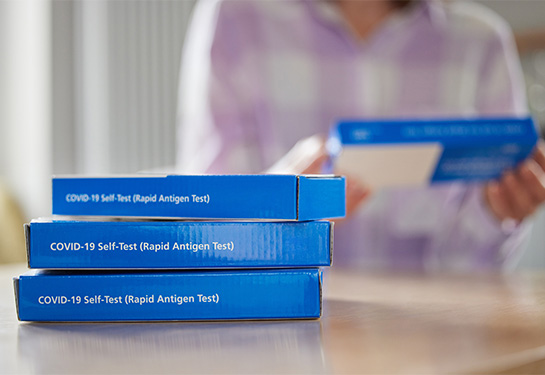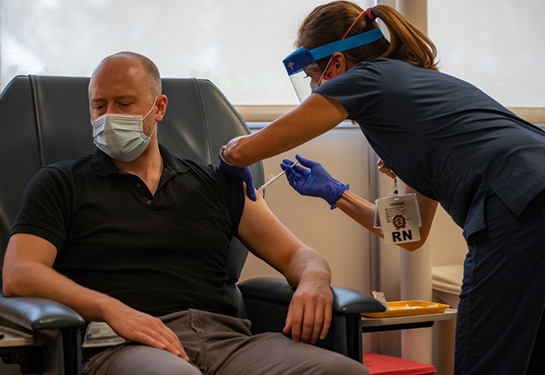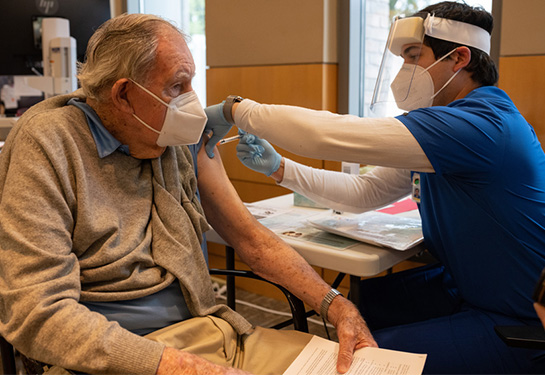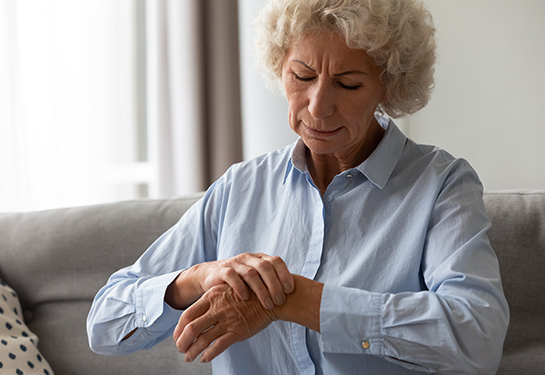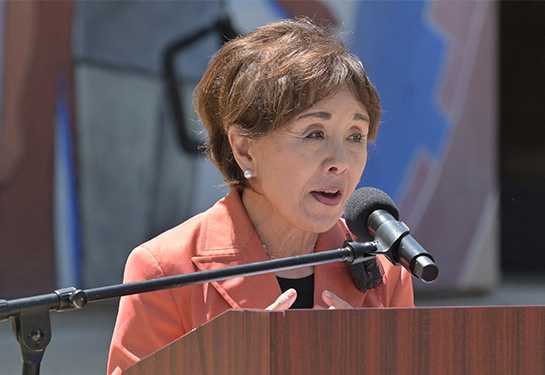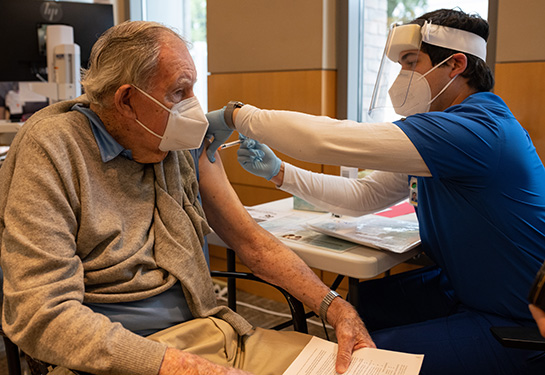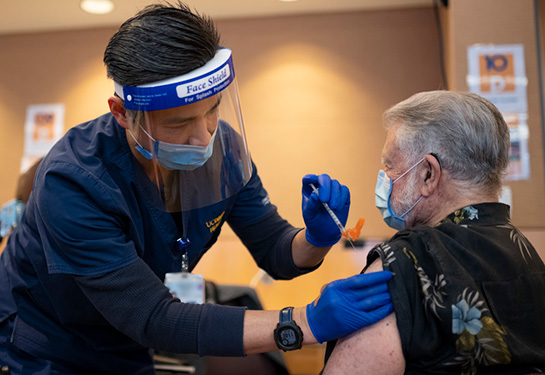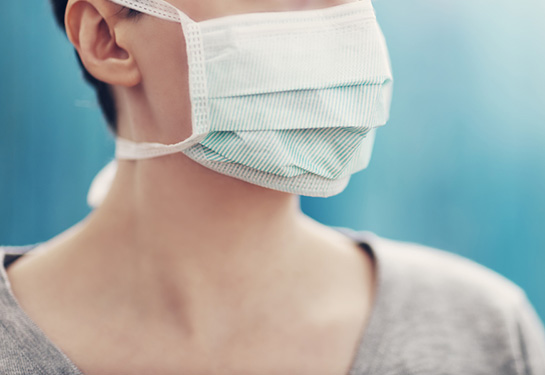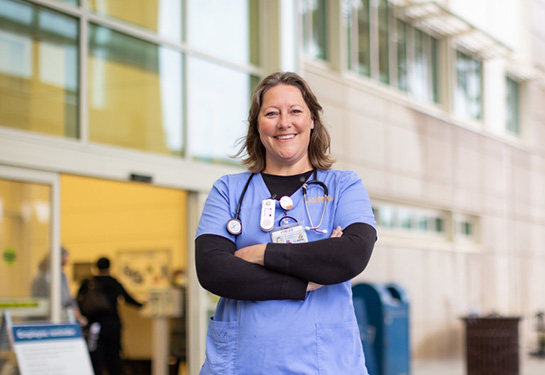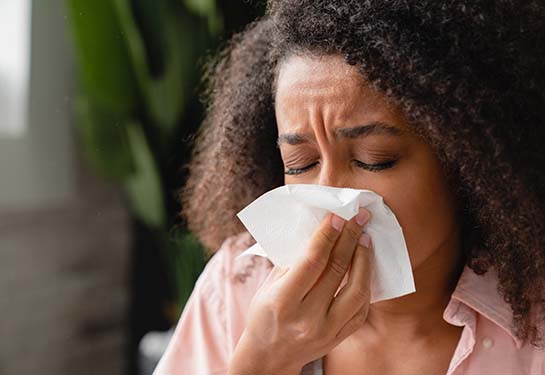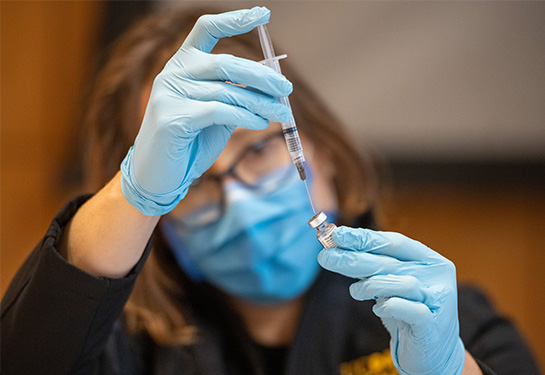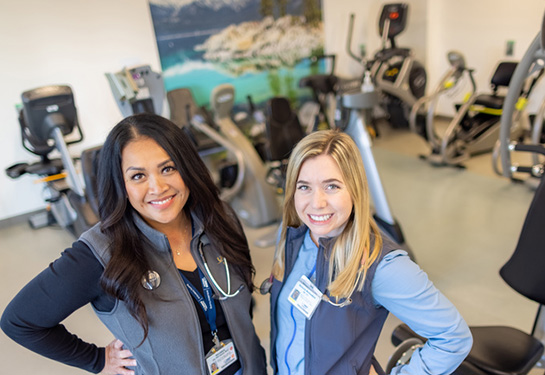Coronavirus News from UC Davis Health
Our experts give you the latest on COVID-19 (novel coronavirus) vaccines, variants, keeping your children safe, and more. Get up-to-date information from UC Davis Health.
June 2025
-
June 23, 2025
Experiencing awe may help people with long COVID feel better mentally
In a new study, researchers examined how the feeling of awe might help people struggling with long COVID.
Read More
March 2025
-
March 20, 2025
The milestones of COVID-19: A timeline
Five years ago this month, COVID-19 disrupted our world. A new interactive timeline shows how UC Davis became a leader in pandemic research, patient care, community testing and more.
Read More -
March 01, 2025
Improving indoor air quality for better public health
UC Davis researchers are studying ways to optimize the flow of outdoor air into buildings for both energy efficiency and reducing exposure to pollutants.
Read More
February 2025
-
February 26, 2025
The next pandemic: COVID-19 showed us how we can fight the next global outbreak
UC Davis Health Chief of Infectious Diseases Stuart Cohen shares how the lessons of COVID-19 have helped us prepare for the next pandemic.
Read More
October 2024
-
October 28, 2024
COVID and flu vaccine clinic for individuals with autism, ADHD and other conditions
A specialized clinic at the UC Davis MIND Institute is offering COVID and flu shots for individuals with neurodevelopmental conditions like autism.
Read More -
October 09, 2024
Long COVID: What have we learned?
Despite numerous studies, we still have a lot to learn about long COVID. An expert in emerging infectious diseases shares what we know about the condition.
Read More
Long COVID: What Have We Learned? Research, Symptoms, and Treatment Explained
August 2024
-
August 28, 2024
Tracking COVID-19 in 2024: Wastewater data provides key early warning sign for surges
Wastewater surveillance has become an important way to detect early signs of regional COVID surges in the community.
Read More -
August 23, 2024
What you need to know about the 2024-25 COVID-19 vaccine recommendations
What do you need to know about the new COVID vaccine? Infectious diseases experts Stuart Cohen and Dean Blumberg answer questions on the 2024-2025 COVID vaccines and who should get them.
Read More -
August 07, 2024
Back to school 2024 amid a COVID surge: Latest symptoms and guidelines
As children go back to school this month with new classrooms and teachers, an infectious diseases expert shares the latest COVID symptoms, treatments guidelines.
Read More
New 2024-25 COVID Vaccine and Variants Explained
January 2024
-
January 03, 2024
Research shows COVID-19 is not strongly linked to long-term loss of kidney function
A new study shows COVID-19 is not strongly linked to long-term loss of kidney function, despite many patients hospitalized with the COVID-19 virus who experienced acute kidney injury.
Read More
October 2023
-
October 19, 2023
Novel dynamic imaging technology captures the body’s immune response to COVID-19 infection
A UC Davis study shows the first-in-human imaging of the body’s CD8 T cell immune response to COVID-19 infection in recovering patients.
Read More
September 2023
-
September 25, 2023
Free at-home COVID tests are back. How to get yours
Starting Sept. 25, households can order up to four free COVID tests. Learn how to order and how you can check to see if your expired tests are still good.
Read More -
September 12, 2023
COVID in 2023: How health experts are handling new vaccines and guidelines
Doctors who take care of COVID patients share how they are keeping themselves and their families safe as cases increase.
Read More -
September 11, 2023
BA.2.86 and EG.5: How will the new COVID-19 boosters work with new variants?
Infectious diseases expert answers questions about the new COVID-19 variants and how well the COVID-19 booster this fall will work against them.
Read More -
September 05, 2023
What is the risk of long COVID?
Pulmonary expert discusses a new CDC report showing the percentage of adults in the United States reporting long COVID symptoms is down.
Read More
New COVID Variants and a Rise in Cases - What We Know About EG.5 (Eris) and BA.2.86
July 2023
-
July 21, 2023
COVID-19 can cause inflammation that results in bone loss, higher fracture risk
A new study involving mice suggests that patients with COVID‐19 may experience long‐term orthopedic issues, such as decreased bone mass, increased fracture risk, and other musculoskeletal complications.
Read More
June 2023
-
June 06, 2023
Rep. Doris Matsui praises UC Davis Health for digital access to care
UC Davis Health is hosting COVID-19 community testing sites where uninsured patients who test positive can get immediate access to a medical provider via telehealth.
Read More -
June 05, 2023
Who should get another COVID-19 vaccine dose?
We asked Dean Blumberg, chief of pediatric infectious diseases, what we need to know about the additional dose of COVID vaccine, recently approved by the CDC.
Read More
March 2023
-
March 06, 2023
COVID-19 vaccines in the Emergency Department for unhoused patients
Emergency Medicine evaluated the feasibility of implementing an ED-based COVID-19 vaccination protocol for unhoused patients. The program marked the first-ever ED-based COVID-19 vaccination program.
Read More
February 2023
-
February 28, 2023
California’s COVID-19 State of Emergency ends today. What does it mean for you?
Infectious disease experts Stuart H. Cohen, Dean Blumberg and Natascha Tuznik answer questions about what the end of California's COVID-19 State of Emergency means for the public.
Read More
January 2023
-
January 17, 2023
XBB.1.5: What you need to know about COVID-19’s ‘Kraken’ variant
The latest COVID-19 variant, XBB.1.5, has quickly led to an increase in cases over the last month. Infectious disease expert Natascha Tuznik answers questions about what you should know about XBB.1.5.
Read More
December 2022
-
December 27, 2022
‘That I was able to recover gives them hope’: Respiratory therapist shares COVID-19 experience
Respiratory therapist Chelsie Gilbeau shared her personal experience battling COVID-19 and overcoming post-COVID. Now she inspires patients recovering from COVID-19 with her story.
Read More
November 2022
-
November 01, 2022
A tripledemic expected this winter
Just when we thought the worst of the COVID-19 pandemic was over, experts are warning that a tripledemic, a trio of viral threats involving respiratory syncytial virus (RSV), influenza (flu) and COVID, is heading our way this winter.
Read More
Tripledemic Concerns - How You Can Avoid RSV, Influenza and COVID-19 This Winter
October 2022
-
October 28, 2022
Some 80% of patients hospitalized with COVID are unvaccinated
As the potential winter surge approaches, about 80% of COVID patients hospitalized at UC Davis Medical Center are unvaccinated, proving the shot and boosters are highly effective at preventing serious illness.
Read More -
October 26, 2022
Respiratory therapy: Vital to post-COVID-19 recovery
Respiratory therapists Veronica Encarnacion and Mallorie Mullendore are working with post-COVID patients at the Pulmonary Rehabilitation Program. They provide a wide range of care, including monitored and supervised exercise and education to empower patients to improve their quality of life.
Read More
When to Contact Your Provider
If you have serious symptoms of illness, contact your primary care provider. UC Davis Health patients can use the MyUCDavisHealth symptom tracker to evaluate whether to seek help. Telehealth video visits and Express Care are also available.
If you have a medical emergency, call 911 and notify them of your COVID-19 symptoms.
Ways to Seek Treatment
If you test positive for COVID-19 at home, you can contact your primary care provider about a prescription for Paxlovid.
Patients who receive primary care or specialty care from UC Davis Health can schedule a telehealth video visit with Express Care.
Visitor Policies
To help limit spread of COVID-19, we have policies for visits to our hospital and outpatient clinics.
UC Davis Health’s Health Highlights e-newsletter provides the latest COVID-19 information and news you can use from our experts.
Subscribe today or share with a friend, and receive coverage on pandemic updates, overall personal health and wellness, research and more.


